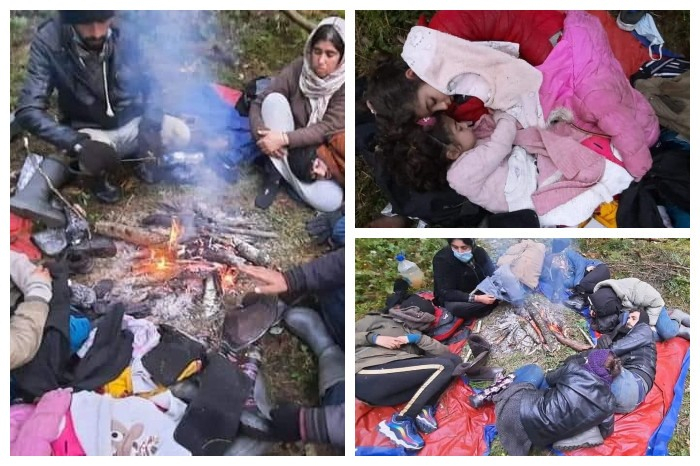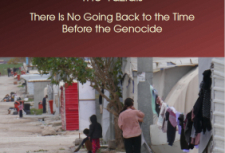Yezidis on the verge of death on the Polish-Belarusian border

A group of Yazidis who fled Iraq has been on the Polish-Belarusian border for more than a week without food and livelihood. They are among hundreds of migrants caught up in a dispute between European countries and Belarus.
"Thirty-two Yazidi migrants are stuck on the border between Belarus and Poland. These are Yezidi families from Shangala. This is a life-threatening situation," President and co-founder of the Shangal Academy Murad Ismael tweeted on Tuesday, calling on Poland to allow them entry for humanitarian reasons.
A relative of a family stranded in Belarus said they had no food and water and were in a desperate state.
"They were in the forest for seven days and seven nights. They didn't eat anything. There is no food for them, and they are on the verge of death. Five or six of them are in serious condition. Sometimes they eat leaves, but not in large quantities, because it is hard for the stomach. As for the water, they drink it from the pond," Fadel Hassan told Rudaw by phone from Germany, adding that eleven of his relatives were stuck at the border.
Thousands of migrants, mainly from Iraq, Afghanistan and African countries, tried to enter the European Union through Belarus this summer. The EU has accused Minsk of pushing migrants to its borders in protest against sanctions imposed in response to the suppression of dissent.
Poland declared a state of emergency at its border and said it had found evidence of links to extremism on the phones of some migrants.
The European Court of Human Rights ruled on August 25 that Poland and Latvia must provide migrants with food, water, clothing, medical care and temporary shelter, if possible, but does not require them to let migrants into their territory. Six people, including at least one Iraqi, have died on the Polish border since August.
Hasan said that his relatives want to be allowed to enter Poland to travel to Germany, otherwise they will die in Belarus.
Hassan himself fled from Shangal to Germany after the militants of the Islamic State terrorist group (ISIL) seized the Yezidi district in northern Iraq in August 2014, committing genocide against the community. IS militants systematically killed men and elderly women, as well as enslaved young women and children. During the days of the genocide, 1,293 people were killed and 6,417 abducted. Today, according to the statistics of the NGO "Joint Assistance to Kurdistan", 2,760 people are still missing.
Hundreds of thousands of people fled their homes, seeking refuge on Mount Shangal, and then in camps in the Kurdistan Region or abroad. Seven years later, most of them are still living in camps, unable to return home due to insecurity and lack of reconstruction. Life in the camps is difficult, exposed to the elements and the risk of fire, and the suicide rate is high.
Baghdad and Erbil reached an agreement on Shangal a year ago, drawing up a roadmap to secure the city by expelling various armed groups linked to the Iranian-backed militias and the Kurdistan Workers' Party (PKK). The deal has not yet been fully implemented.
Murad Ismael called on the international community to help the Yezidis in their homeland. "Continued failures will lead to riskier migration like this," he tweeted.
Ezdina
Tags: #yazidisinfo #newsyazidi #aboutyazidi
Yezidis on the verge of death on the Polish-Belarusian border

A group of Yazidis who fled Iraq has been on the Polish-Belarusian border for more than a week without food and livelihood. They are among hundreds of migrants caught up in a dispute between European countries and Belarus.
"Thirty-two Yazidi migrants are stuck on the border between Belarus and Poland. These are Yezidi families from Shangala. This is a life-threatening situation," President and co-founder of the Shangal Academy Murad Ismael tweeted on Tuesday, calling on Poland to allow them entry for humanitarian reasons.
A relative of a family stranded in Belarus said they had no food and water and were in a desperate state.
"They were in the forest for seven days and seven nights. They didn't eat anything. There is no food for them, and they are on the verge of death. Five or six of them are in serious condition. Sometimes they eat leaves, but not in large quantities, because it is hard for the stomach. As for the water, they drink it from the pond," Fadel Hassan told Rudaw by phone from Germany, adding that eleven of his relatives were stuck at the border.
Thousands of migrants, mainly from Iraq, Afghanistan and African countries, tried to enter the European Union through Belarus this summer. The EU has accused Minsk of pushing migrants to its borders in protest against sanctions imposed in response to the suppression of dissent.
Poland declared a state of emergency at its border and said it had found evidence of links to extremism on the phones of some migrants.
The European Court of Human Rights ruled on August 25 that Poland and Latvia must provide migrants with food, water, clothing, medical care and temporary shelter, if possible, but does not require them to let migrants into their territory. Six people, including at least one Iraqi, have died on the Polish border since August.
Hasan said that his relatives want to be allowed to enter Poland to travel to Germany, otherwise they will die in Belarus.
Hassan himself fled from Shangal to Germany after the militants of the Islamic State terrorist group (ISIL) seized the Yezidi district in northern Iraq in August 2014, committing genocide against the community. IS militants systematically killed men and elderly women, as well as enslaved young women and children. During the days of the genocide, 1,293 people were killed and 6,417 abducted. Today, according to the statistics of the NGO "Joint Assistance to Kurdistan", 2,760 people are still missing.
Hundreds of thousands of people fled their homes, seeking refuge on Mount Shangal, and then in camps in the Kurdistan Region or abroad. Seven years later, most of them are still living in camps, unable to return home due to insecurity and lack of reconstruction. Life in the camps is difficult, exposed to the elements and the risk of fire, and the suicide rate is high.
Baghdad and Erbil reached an agreement on Shangal a year ago, drawing up a roadmap to secure the city by expelling various armed groups linked to the Iranian-backed militias and the Kurdistan Workers' Party (PKK). The deal has not yet been fully implemented.
Murad Ismael called on the international community to help the Yezidis in their homeland. "Continued failures will lead to riskier migration like this," he tweeted.
Ezdina
Tags: #yazidisinfo #newsyazidi #aboutyazidi

























